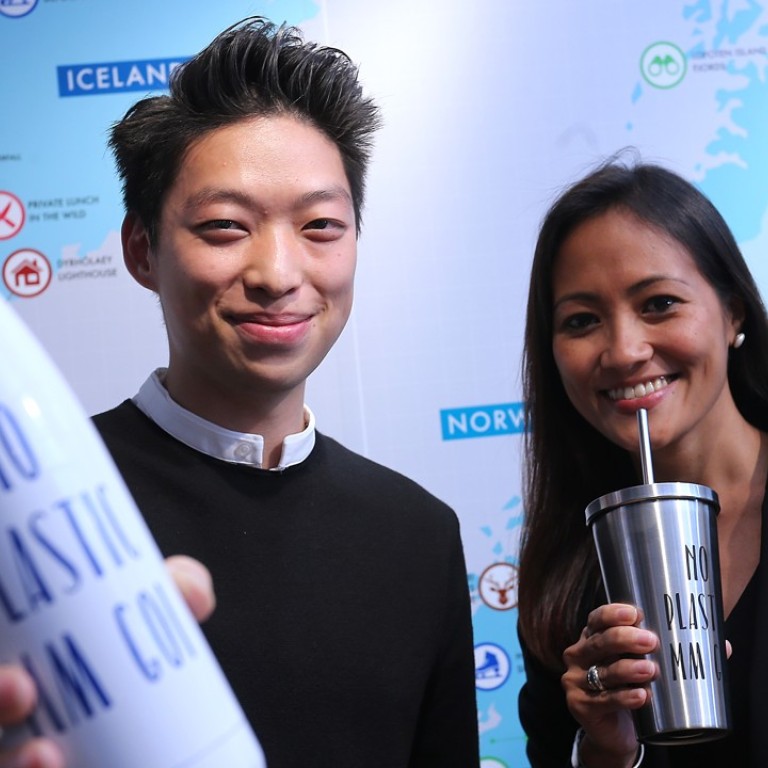
Toxic plastic particles in ocean should be a wake-up call for Hongkongers to recycle and reduce use of disposables
Government, businesses and consumers need to act now to reduce plastic pollution, say panellists at a discussion on sustainable living held after screening of documentary, A Plastic Ocean
Before filmmaker Jo Ruxton started to make her documentary on marine plastic waste, she expected to discover mainly huge swathes of plastic trash choking the seas.
But after venturing out into the Pacific Ocean to film the award-winning documentary A Plastic Ocean Ruxton realised that there was a more sinister problem – microparticles of plastic waste in the water, mostly unseen to the eye but ingested by marine life.
The 99-minute film, made with journalist Craig Leeson, freediver Tanya Streeter and a team of international scientists, documents how plastic items in the ocean break up into small particles that enter the food chain, where they attract toxins like a magnet. These toxins are eventually consumed by humans.
Tough to swallow: Tiny bits of plastic have infiltrated most tap water around the world, study reveals
“I’d been working at the BBC for 12 years, making mostly underwater documentaries. And every time we would show the ocean as being full of life and very clean, and the fish were plentiful, but, of course, we all know that’s not the case.”
“I just feel we have a duty to tell people the truth. So, I wanted to make a film that actually had a clear environmental message,” Ruxton says.
A Plastic Ocean, for which the team spent four years shooting at more than 20 locations, sheds light on the causes and consequences of plastic pollution.
It was released in Hong Kong cinemas last year and has been shown at conferences and festivals in the city including a private screening in Central last Wednesday held by Eco Drive, a volunteer group to promote a sustainable living environment.
Ruxton, who has lived in Hong Kong for 14 years, says she was surprised to learn that the city, despite being developed, has very limited resources when it comes to recycling and is facing a serious plastic waste problem.
Welcome step to cut use of plastic bottles
Government figures show the city’s recycling rate for plastics has been declining. In 2015, just 11 per cent of plastic waste was recycled compared to 32 per cent in 2012, partly due to “weak demand for raw plastic materials by the mainland Chinese manufacturing sector and stricter controls imposed by mainland authorities”, according to the city’s Environmental Protection Department.
Ruxton, who cofounded the non-profit Plastic Oceans Foundation, says China’s stricter waste import rules should serve as a wake up call to Hongkongers, who throw away tonnes of plastic every day.
On who is mostly responsible for poor recycling habits, she says: “I think the Hong Kong government, to an extent, has to hold their hand up.
They think someone will take care of it and it will eventually go away
“They’ve allowed so much construction to go ahead and new towns to be built, and they have been well aware of the growing population in Hong Kong. But they have not given any thought to the realities of a lot of people living together in a very small place.”
She also attributes the problem to consumers, as conservation “hasn’t been anyone’s priority”, with people getting themselves into this “silly plastic waste situation because they think someone will take care of it and it will eventually go away”.
Ruxton says she wants to remind Hongkongers that “plastic is forever and is indestructible” and they must stop believing they can throw it away as there is no “away”.
Rubbish sacks which double up as shopping bags to go on sale for Hong Kong waste charging
“The oceans are our planet’s life-support system and we need to act now to prevent plastic waste from poisoning them,” she says.
At the panel discussion after the documentary screening, social enterprise HK Recycles’ business development manager Philippe Li Kei-lap spoke of how it went door-to-door to collect recyclables from residential and commercial customers.

Li tells the Post that one of the reasons why his organisation exists is because “we see there’s a gap between the customers and the collection points”.
He points out that the recycling bins on the street do not work for most people.
“People aren’t willing to go down[stairs]. Or if there isn’t a collection point near where they live, then it’s hard for them to do it.”
Li says there is in some way a lack of understanding in society about recycling, as most people are results-oriented and in this case, cannot see the outcome of their actions.
“Recycling is an altruistic behaviour,” he says. “You have to give your time and effort but you won’t see an immediate benefit, so it’s hard for someone to actually be committed to doing it without knowing what the benefits are.”
Hong Kong throws away 5.2 million bottles every single day – is it time to ban sale of the plastic disposables?
Patricia Dwyer, who has 15 years of sustainability leadership experience and was a panellist at the discussion, says the business sector plays an important role when it comes to sustainability, as it can make an impact on consumer behaviour and supply chains.
“Some might say that the government is or is not doing enough, but the impact of business cannot be underestimated, and we find businesses need help or specialist experience and expertise to realise sustainability commercially” Dwyer says.
She founded The Purpose Business, a local consulting agency that helps companies develop responsible business strategies.
Dwyer says although her business has grown in the past few years, the sector still needs to improve its understanding of sustainability.
“The financial benefits of sustainability are evident, and while I don’t think people are speaking that language yet, it's how we should be communicating [the value of sustainable business practices],” she says.

